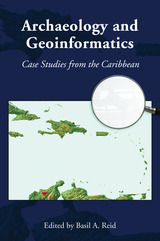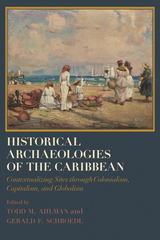3 books by Gilmore III, R. Grant

Archaeology and Geoinformatics
Case Studies from the Caribbean
Edited by Basil A. Reid
University of Alabama Press, 2008
Provides tremendous insight and an excellent grasp of the special geoinformatics needs of Caribbean researchers
Addressing the use of geoinformatics in Caribbean archaeology, this volume is based on case studies drawn from specific island territories, namely, Barbados, St. John, Puerto Rico, Jamaica, Nevis, St. Eustatius, and Trinidad and Tobago, as well as inter-island interaction and landscape conceptualization in the Caribbean region. Geoinformatics is especially critical within the Caribbean where site destruction is intense due to storm surges, hurricanes, ocean and riverine erosion, urbanization, industrialization, and agriculture, as well as commercial development along the very waterfronts that were home to many prehistoric peoples. By demonstrating that the region is fertile ground for the application of geoinformatics in archaeology, this volume places a well-needed scholarly spotlight on the Caribbean.
Addressing the use of geoinformatics in Caribbean archaeology, this volume is based on case studies drawn from specific island territories, namely, Barbados, St. John, Puerto Rico, Jamaica, Nevis, St. Eustatius, and Trinidad and Tobago, as well as inter-island interaction and landscape conceptualization in the Caribbean region. Geoinformatics is especially critical within the Caribbean where site destruction is intense due to storm surges, hurricanes, ocean and riverine erosion, urbanization, industrialization, and agriculture, as well as commercial development along the very waterfronts that were home to many prehistoric peoples. By demonstrating that the region is fertile ground for the application of geoinformatics in archaeology, this volume places a well-needed scholarly spotlight on the Caribbean.
[more]

Historical Archaeologies of the Caribbean
Contextualizing Sites through Colonialism, Capitalism, and Globalism
edited by Todd M. Ahlman and Gerald F. Schroedl
University of Alabama Press, 2019
New perspectives on Caribbean historical archaeology that go beyond the colonial plantation
Historical Archaeologies of the Caribbean: Contextualizing Sites through Colonialism, Capitalism, and Globalism addresses issues in Caribbean history and historical archaeology such as freedom, frontiers, urbanism, postemancipation life, trade, plantation life, and new heritage. This collection moves beyond plantation archaeology by expanding the knowledge of the diverse Caribbean experiences from the late seventeenth through the mid-nineteenth centuries.
The essays in this volume are grounded in strong research programs and data analysis that incorporate humanistic narratives in their discussions of Amerindian, freedmen, plantation, institutional, military, and urban sites. Sites include a sample of the many different types found across the Caribbean from a variety of colonial contexts that are seldom reported in archaeological research, yet constitute components essential to understanding the full range and depth of Caribbean history.
Contributors examine urban contexts in Nevis and St. John and explore the economic connections between Europeans and enslaved Africans in urban and plantation settings in St. Eustatius. The volume contains a pioneering study of frontier exchange with Amerindians in Dominica and a synthesis of ceramic exchange networks among enslaved Africans in the Leeward Islands. Chapters on military forts in Nevis and St. Kitts call attention to this often-neglected aspect of the Caribbean colonial landscape. Contributors also directly address culture heritage issues relating to community participation and interpretation. On St. Kitts, the legacy of forced confinement of lepers ties into debates of current public health policy. Plantation site studies from Antigua and Martinique are especially relevant because they detail comparisons of French and British patterns of African enslavement and provide insights into how each addressed the social and economic changes that occurred with emancipation.
Contributors
Todd M. Ahlman / Douglas V. Armstrong / Samantha Rebovich Bardoe / Paul Farnsworth / Jeffrey R. Ferguson / R. Grant Gilmore III / Diana González-Tennant / Edward González-Tennant / Barbara J. Heath / Carter L. Hudgins Kenneth G. Kelly / Eric Klingelhofer / Roger H. Leech / Stephan Lenik / Gerald F. Schroedl / Diane Wallman / Christian Williamson
Historical Archaeologies of the Caribbean: Contextualizing Sites through Colonialism, Capitalism, and Globalism addresses issues in Caribbean history and historical archaeology such as freedom, frontiers, urbanism, postemancipation life, trade, plantation life, and new heritage. This collection moves beyond plantation archaeology by expanding the knowledge of the diverse Caribbean experiences from the late seventeenth through the mid-nineteenth centuries.
The essays in this volume are grounded in strong research programs and data analysis that incorporate humanistic narratives in their discussions of Amerindian, freedmen, plantation, institutional, military, and urban sites. Sites include a sample of the many different types found across the Caribbean from a variety of colonial contexts that are seldom reported in archaeological research, yet constitute components essential to understanding the full range and depth of Caribbean history.
Contributors examine urban contexts in Nevis and St. John and explore the economic connections between Europeans and enslaved Africans in urban and plantation settings in St. Eustatius. The volume contains a pioneering study of frontier exchange with Amerindians in Dominica and a synthesis of ceramic exchange networks among enslaved Africans in the Leeward Islands. Chapters on military forts in Nevis and St. Kitts call attention to this often-neglected aspect of the Caribbean colonial landscape. Contributors also directly address culture heritage issues relating to community participation and interpretation. On St. Kitts, the legacy of forced confinement of lepers ties into debates of current public health policy. Plantation site studies from Antigua and Martinique are especially relevant because they detail comparisons of French and British patterns of African enslavement and provide insights into how each addressed the social and economic changes that occurred with emancipation.
Contributors
Todd M. Ahlman / Douglas V. Armstrong / Samantha Rebovich Bardoe / Paul Farnsworth / Jeffrey R. Ferguson / R. Grant Gilmore III / Diana González-Tennant / Edward González-Tennant / Barbara J. Heath / Carter L. Hudgins Kenneth G. Kelly / Eric Klingelhofer / Roger H. Leech / Stephan Lenik / Gerald F. Schroedl / Diane Wallman / Christian Williamson
[more]

Protecting Heritage in the Caribbean
Peter E. Siegel
University of Alabama Press, 2011
Heritage preservation is a broad term that can include the protection of a wide range of human-mediated material and cultural processes ranging from specific artifacts, ancient rock art, and features of the built environment and modified landscapes. As a region of multiple independent nations and colonial territories, the Caribbean shares a common heritage at some levels, yet at the same time there are vast historical and cultural differences. Likewise, approaches to Caribbean heritage preservation are similarly diverse in range and scope.
This volume addresses the problem of how Caribbean nations deal with the challenges of protecting their cultural heritages or patrimonies within the context of pressing economic development concerns. Is there formal legislation that requires cultural patrimony to be considered prior to the approval of development projects? Does legislation apply only to government-funded projects or to private ones as well? Are there levels of legislation: local, regional, national? Are heritage preservation laws enforced? For whom is the heritage protected and what public outreach is implemented to disseminate the information acquired and retained?
In this volume, practitioners of heritage management on the frontline of their own islands address the current state of affairs across the Caribbean to present a comprehensive overview of Caribbean heritage preservation challenges. Considerable variability is seen in how determined and serious different nations are in approaching the responsibilities of heritage preservation. Packaging these diverse scenarios into a single volume is a critical step in raising awareness of the importance of protecting and judiciously managing an ever-diminishing fund of Caribbean heritage for all.
Contributors
Todd M. Ahlman / Benoît Bérard / Milton Eric Branford / Richard T. Callaghan / Kevin Farmer / R. Grant Gilmore III / Jay B. Haviser / Ainsley C. Henriques / William F. Keegan / Bruce J. Larson / Paul E. Lewis / Vel Lewis / Reg Murphy / Michael P. Pateman / Winston F. Phulgence / Esteban Prieto Vicioso / Basil A. Reid / Andrea Richards / Elizabeth Righter / Kelley Scudder-Temple / Peter E. Siegel / Christian Stouvenot / Daniel Torres Etayo
[more]
READERS
Browse our collection.
PUBLISHERS
See BiblioVault's publisher services.
STUDENT SERVICES
Files for college accessibility offices.
UChicago Accessibility Resources
home | accessibility | search | about | contact us
BiblioVault ® 2001 - 2024
The University of Chicago Press









